Fotografická soutěž
Pošlete nám vtipné foto na téma: „Jak studujete češtinu?“
Posílejte nám fotky z vašich lekcí nebo z vašeho domácího i „nedomácího“ studia češtiny do 20. května 2015 na náš e-mail: [email protected]. Heslo je: Fotografická soutěž.
Vyhlášení výsledků proběhne 30. května 2015.
Vítěz vyhraje 1 měsíc standardního kurzu zdarma.
Photo contest
Send us funny photos on the topic: "How do you study Czech?"
Send photos from your Czech lessons, your domestic or “non-domestic” studies of Czech to our e-mail [email protected] by 20th May, 2015.
Results will be announced on the 30th May, 2015.
The winner will receive a free standard month course.
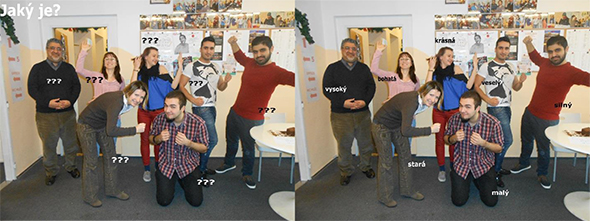
INTERVIEW
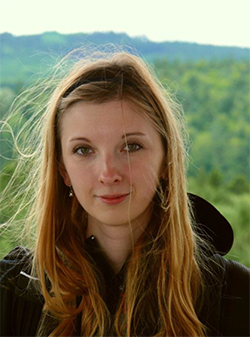 Interview with Eliška Churaňová lecturer of Pronunciation sessions
Interview with Eliška Churaňová lecturer of Pronunciation sessions
- Eliška, can you tell us why pronunciation is important (sometimes even "vitally important")? Can you give some examples when wrong pronunciation literally “did not pay off”?
Correct pronunciation is necessary for creating a positive first impression. We always judge others by the way they talk, their discourse. Speech with flawless articulation is pleasant and easy to understand.
And when the wrong pronunciation doesn’t pay off? Maybe when students don´t realize that sounds that are interchangeable in their native language, can move or change the word meaning completely in Czech. For example, if we confuse the letters "r" and "l", it may happen that a completely harmless Czech word changes to an expression that should not be in the dictionary of a cultivated student. :) - What can students, who come to your individual counselling lesson of pronunciation, expect? How do the lessons proceed?
In the first lesson I try to figure out what exact pronunciation difficulties the student has. First, I encourage the student to tell me a few sentences about himself, his interests and native language. Now, the specific native language is very important, because the articulation difficulties in Czech may be based on it. When talking, I analyse the main pronunciation problems. Subsequently, I introduce the student to his speech deficiencies, and then we concentrate on specific pronunciation and listening exercises. To begin, I always put the emphasis on teaching the students to listen properly: if we 5 www.czlt.cz are able to identify the incorrectly pronounced sound by listening to correct forms, it is easier for us to pronounce it correctly. The focus of other lessons depends on what the student needs to practice. Teaching is not identical for everyone; it is flexibly adapted to specific problems that the student faces. We usually start with phonemes, continue through the phenomenon of accentuation in Czech, and the last lesson is devoted to sentence melody. - How often should students attend these classes?
Ideally once in two or three weeks. If the interval is shorter, the new knowledge cannot „settle“; on the other hand, if the interval is longer, it can be forgotten.
It is however necessary that the students practice the pronunciation at home as well – it is not possible to learn the correct pronunciation only in the lessons. This is why I also email the students some of the exercises. - How do you like CLT and our students?
What I appreciate most about CLT is the friendly atmosphere among students and teachers. It's not only a job for me, but also an environment I always look forward to. I appreciate my students, because the very fact that they sign on for a pronunciation class makes it clear that they are not indifferent to correct pronunciation. - What is your favourite activity that you use during the lesson?
At the end of the lesson I usually play a pronunciation game of my own creation. I like inventing these activities and I am pleased to see that students also enjoy the games. My favourites are a phonetic memory game; a crossword with names of animals, which I use to show the difference between written and spoken Czech; a poem focused on the Czech accent; and conversation exercises practicing certain phoneme, such as "names of food with š". :)
RECEPT
Cibulová polévka
- Nakrájíme čtyři velké cibule na plátky.
- Rozpustíme máslo ve velkém hrnci.
- Přidáme cibuli a necháme zkaramelizovat.
- Potom přidáme lžíci mouky a mícháme dvě minuty.
- Nalijeme jeden litr horkého kuřecího bujónu.
- Přivedeme k varu a přidáme jeden bobkový list a tymián.
- Vaříme třicet minut.
- Přidáme sklenku bílého vína, pepř a sůl.
- Ještě vaříme deset minut. Hotovou polévku nalijeme do misky, přidáme plátek sýra.
- Zapečeme sýr do hněda.
- Podáváme s opečeným chlebem.
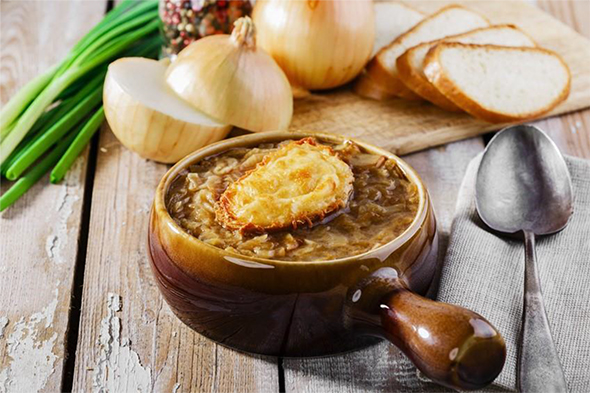
POHÁDKA
 Drak a princezna
Drak a princezna
Slova v závorce dejte do správného tvaru.
Byla jedna princezna, která bydlela v………………(zámek).
Byla………………………..(krásná/superlativ) žena. Král hledal nejlepšího ………………………….(muž) pro ni.
Hodně……………………..(princ) přišlo do zámku, ale princezna neměla ráda……………………….(nikdo).
Jednoho dne přišel drak. Byl největší a nejsilnější zvíře na…………………..(svět). Odnesl si ………………………(princezna).
Král byl smutný a zklamaný. Rozhlásil, že kdo zachrání jeho dceru, dostane ji za ženu.
Nejstatečnější princ šel k ………………………(drak). Drak měl pro prince hádanku. „Když odpovíš dobře, princezna bude tvoje.”
„Kdo je rychlejší než já, je slyšet, ale není vidět, hryže, ale je bez ……………………(jizva/pl.)?“
Princ přemýšlel dlouho. Nakonec odpověděl: „To je vítr. Nikdo není rychlejší a nikdo ho nevidí.“
„Máš pravdu,………………………(princ)“, řekl drak. „Princezna je tvoje.“
(Antoine z Francie)
TÉMA
Zapomínání
Takové zapomínání je zrádné. Občas se nám hodí, někdy je dokonce potřebné. Ale nastanou i situace, kdy nám značně znepříjemňuje život. Například když si za nic na světě nemůžeme vzpomenout, co jsme to ještě měli koupit, kdy nám odjíždí ten autobus, nebo kam jsme to položili ty zatracené klíče.
Selhání paměti dokonce může vést k situacím mnohdy komickým. Asi jako když sedíte na gauči a sledujete dědečka, jak marně chodí po bytě, brblá si pod vousy, rozhlíží se a všude nakukuje. Zeptáte se ho, co se to vlastně snaží najít, a když slyšíte odpověď, zacukají vám koutky. Samozřejmě, hledané brýle na čtení má děda celou dobu na čele.
Nebo si pro něco chcete dojít vedle do pokoje, ale jakmile překročíte práh, mozek vyhlásí stávku. Ze setrvačnosti dojdete ke skříni a otevřete dveře. Avšak pak už nevíte co dál. Jen stojíte a přemítáte, proč jste to sem vlastně šli. Když vás ani po dvou minutách nic nenapadne, vzdáte své marné snažení, zavřete skříň a s nespokojeným vrtěním hlavy odcházíte pryč.
Takové situace zná určitě každý. Jakmile jste v roli pozorovatele, je vám do smíchu. Ale když se tohle stane vám, cítíte se být zrazeni svým vlastním rozumem. S pamětí je to těžké. Je známo, že mozek všechny informace skladuje. Ale občas je nadlidský úkol najít ten správný kout, tu správnou skrýš tam někde hluboko ve složité spleti všech ostatních nepodstatných detailů a vybrat si z toho to, co zrovna potřebujete.
V některých životních situacích nám ale zapomínání přijde rozhodně vhod, i když občas to jde ztěžka. Není snadné myšlenky prostě vyhnat a donutit je, aby se už nevracely. Ale někdy to může být jediné řešení.
Zapomínání je jako oheň – dobrý sluha, ale špatný pán.
(Iryna z Běloruska)
Napište, jak si vy trénujete paměť?
Vyberte jednu z možností
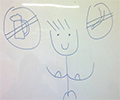 a) Zákaz kouřit
a) Zákaz kouřit
b) Zákaz pít pivo a kouřit
c) Zákaz pít pivo
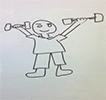 a) Ukazovat
a) Ukazovat
b) Házet
c) Posilovat
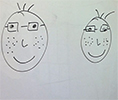 a) Vlevo je větší
a) Vlevo je větší
b) Jsou stejní
c) Vpravo je větší


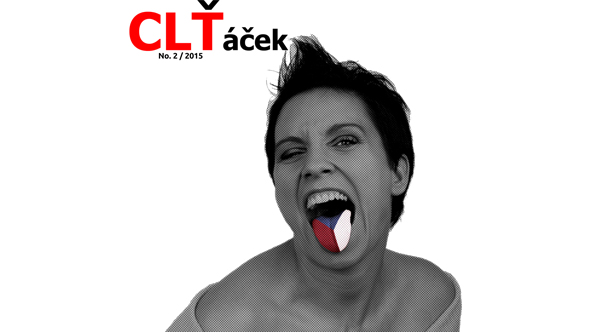
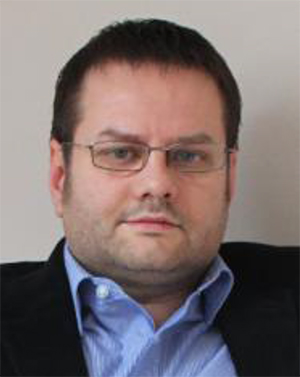 Dear students,
Dear students,